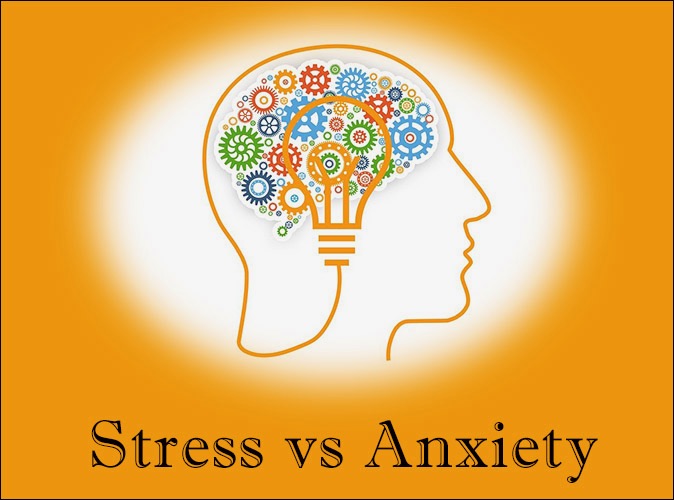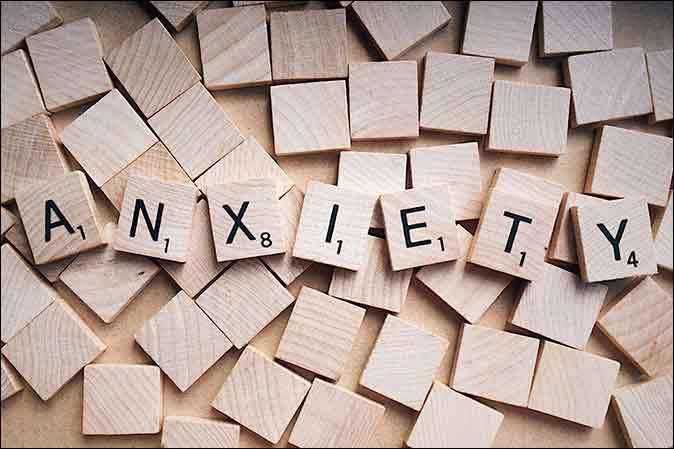
Are you stressed out not knowing wether you’re suffering from Anxiety or Stress? Though they may sound similar to many people, it’s important to recognize the difference between stress vs anxiety.
There is no avoiding the inevitable challenges that come with being human. Whether our problems are physical, mental, spiritual, financial, or involve any other aspect of life, no one gets off completely free, despite how it may appear to others.
During these personal trials, it’s normal to feel overwhelmed, and understanding the distinction between stress and anxiety can help keep us calm as we overcome our troubles.
Since the symptoms of anxiety and stress can have a considerable amount of overlap, the difference between the two conditions isn’t always immediately clear. However, there is a significant difference.
Key Points About Stress vs Anxiety
Stress is generally short-term. It is the body’s response to an apparently difficult situation. This might be due to an illness, social or professional pressures, or even academic demands.
In fact, stress can be positive in that it can motivate us to accomplish a challenging task. However, it can also be severe enough that it causes physical and mental symptoms that diminish our quality of life.
The key, though, is that once the difficult situation is resolved, the symptoms of stress usually disappear and we should feel like our normal selves again. That’s not the case with anxiety.

Anxiety generally has many of the same symptoms as stress, though they are likely more pronounced, and they don’t fade away after a hard situation has passed.
Anxiety disorder is a mental health condition that can linger for a lifetime, especially if it’s left untreated.
Both of stress and anxiety are incredibly common and widespread conditions. A staggering 40 million adults in the U.S. suffer from symptoms of anxiety in a given year, according to the Anxiety and Depression Association of America (ADAAA).
Just as troublesome is an estimated 75 percent of adults in the country report feeling moderate to severe stress levels. This is critical because ignoring stress symptoms for too long can turn into depression and anxiety.
Common Types of Stress and Symptoms
There is a lot of well-publicized research about the effects of stress on our overall health. People coping with high stress levels are at a greater risk of heart attack, stroke, hypertension, diabetes, and poor functioning immune systems.
Other stress symptoms can include some of the following:
- Muscle tension, back and neck pain
- Headaches
- Rapid heart rate
- Dizziness or lightheadedness
- Insomnia and chronic exhaustion
- Gastrointestinal issues
- Mood swings from depression to irritability
- Difficulty focusing because of excessive worry or ruminating
- Diminished or nonexistent libido
- Problems making decisions
- Feeling overwhelmed
- Self-medicating with drugs and alcohol to relax or cope with problems
The severity of stress symptoms will vary from person to person, but recognizing stress for what it is offers an opportunity to manage it before it becomes worse.

Ways of Coping With Stress
Knowing how to manage stress takes practice, and what works for one person might seem ridiculous to another. Finding a personal method for coping with your stress is what’s most important.
Here are some effective stress coping mechanisms that anyone can personalize:
- Listen to soothing music. In the same way that high-energy, fast paced music can get us moving, calming, relaxing music can decrease the body’s stress response. Pop in some earplugs and explore melodies that provide a sense of peacefulness.
- Practice mindful meditation techniques, which studies have shown can have a meaningful impact on the symptoms of stress, including lowering blood pressure, regulating inflammation in the body and improving circadian rhythms.
- Get regular exercise. When we engage in moderate to intense exercise, our bodies produce dopamine, a feel good neurotransmitter that helps combat stress. Creating a routine exercise regimen is also an excellent outlet for releasing pent up tension caused by daily stressors.
- Get outdoors. This isn’t always as easy during wintertime, but getting some sunshine on our faces for just 20 minutes or so can have a big impact. Taking a brisk walk is also a great chance to combine the outdoors and exercise.
- Find a hobby and look for low stress jobs. Whether it’s flying kites, doing jigsaw puzzles, or even something more involved like collecting, a pleasurable distraction from stress is good for the mind.
- Avoid alcohol and drug use. While substance use may provide temporary relief, the long-term effect will only make the symptoms of stress worse. There is also the risk of developing substance dependency or addiction.
Finally, there’s a good chance that speaking with a counselor or a trusted confidante can help alleviate some of the worries and fears brought on by stress. Don’t be afraid to seek professional help if necessary. This can be a great way to develop effective coping strategies.

Typical Anxiety Symptoms
While an anxiety disorder comes with many of the above stress symptoms, it is primarily characterized by excessive, or even crippling worry that’s out of proportion to the actual issues a person is experiencing.
A diagnosis is typically only given if a person experiences anxiety symptoms for six months or longer.
Other anxiety symptoms can include:
- An inability to stop worrying or ruminating over perceived problems
- Shortness of breath
- Chest pain or rapid heart rate
- Continued or profuse sweating
- Always on edge or easily startled
- Mood swings from fear and worry to depression and hopelessness
- Insomnia and exhaustion
- Body aches and pains
- Symptoms severe enough to make daily responsibilities, such as work, school, or basic social interactions difficult or impossible to manage
Treatment for Anxiety Disorders
Like their symptoms, managing anxiety can look a lot like managing stress.
Lifestyle changes like exercise, hobbies, meditation, avoiding drugs and alcohol, and eating a balanced, nutritious diet have positive effects on both the mind and the body and can help improve anxiety symptoms.
However, a diagnosed anxiety disorder usually requires a higher level of care.
In addition to the lifestyle changes mentioned above, treatment for anxiety disorders can include some of the following:
Therapy for Anxiety Disorders
One-on-one therapy or counseling with a licensed therapist or a psychiatrist is an important means of treating anxiety disorders.
Treatment approaches in therapy can include Cognitive Behavioral Therapy (CBT) and Dialectical Behavior Therapy (DBT), which teach people how to cope stress and anxiety.
Anxiety Medications
Medications in some cases, may be prescribed for anxiety. Antidepressant medications can help reduce the symptoms of anxiety, though the effect is not immediate.
It can take several weeks for some antidepressants to work and it may take even longer to find the one that works effectively without side effects.
Other, stronger drugs like benzodiazepines are used in severe cases that require a sedative, but long-term use is problematic because these drugs are extremely habit forming.
The important thing to know is that anxiety disorders are treatable and people can overcome them with help, compassion, and support.
Knowing the difference between stress vs anxiety symptoms can help to manage their effects and seek treatment if necessary.
Related Posts
- Jobs for People with Anxiety - Low Stress Jobs
Some of the best jobs for people with anxiety are low stress jobs that involve…
- High-Functioning Anxiety Symptoms and Treatment
Anxiety disorders are the most common form of mental illness in the United States. They…
- Cocaine Withdrawal Symptoms, Treatment and Detox
Giving up a stimulant substance like cocaine has a complex psychological effect on the recovering…
